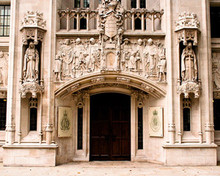
In guidance published today in a press notice, the president of the Supreme Court said that allowing such communications may enhance public interest in the progress of a case, but must not disrupt the running of the court.
Due to the nature of cases which appear before the court the notice states that there is "rarely any reason" why what is said in court should not be placed immediately in the public domain.
As a result the Justices of the Supreme Court "are content with legal teams, journalists and members of the public communicating to the outside word what is happening in the courtroom".
Exceptions will apply however, such as cases where there are formal reporting restrictions in place, family cases involving the welfare of a child, and cases where publication of proceedings might prejudice a pending jury trial.
"Those attending such cases will be informed by notices placed at the doors of the courtroom that restrictions are in place," the guidance adds.
"The rapid development of communications technology brings with it both opportunities and challenges for the justice system,"
Lord Phillips, president of the Supreme Court, says in the press notice.
"An undoubted benefit is that regular updates can be shared with many people outside the court, in real time, which can enhance public interest in the progress of a case and keep those who are interested better informed."
In December the Lord Chief Justice, England and Wales' most senior judge, outlined interim guidance on the use of Twitter in court, saying that individuals will be given permission if a formal or informal application to the court is made.
The guidance stated that judges can authorise live reporting on a case-by-case basis and at times it may be limited to "representatives of the media for journalistic purposes".
Photo of Supreme Court by Shark Attacks on Flickr. Some rights reserved.
Free daily newsletter
If you like our news and feature articles, you can sign up to receive our free daily (Mon-Fri) email newsletter (mobile friendly).









